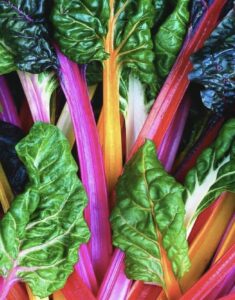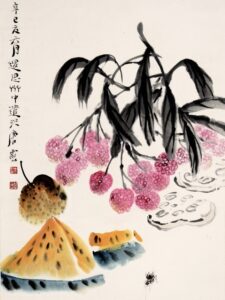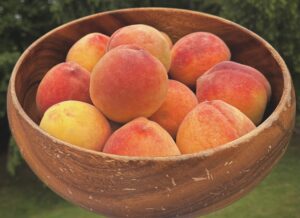According to traditional Chinese dietary practice, foods should aid in balancing and contributing to the health of the person, and what that requires varies throughout the seasonal shifts of the year. The daily diet in summertime should rely more on vegetables and fruits than in other seasons to stimulate the appetite, which can become sluggish due to seasonal heat and humidity. Due to environmental heat and subsequent loss of fluids through sweating, Yin fluids of the body can become depleted, leading to dehydration and taxation. Seasonal fruits and vegetables help to replenish Yin fluids, which in turn, keep the body temperature cooler. In the summertime, Qi and Blood move more vigorously than at other times of the year. Such physiological changes contribute to overfunctioning of the Heart, with the potential for Yang Qi to flow excessively to the exterior of the body.
 According to the five-element theory, an over-functioning of Fire [Heart] restricts the functioning of Metal [Lung], and so it is advisable to eat a complement of moderately pungent flavor of corriander, chive, parsley, and the like; while reducing foods and drinks of a bitter taste including hops beverages, vinegar (both sour and bitter), coffee, and the like, because bitter is the flavor of the Fire element, and exherts control over the Metal element. The Lung maintains normal sweating, essential during the heat of summertime, to regulate inner heat and fluid moisture. Sweat is the humor of the Heart, and excessive sweating ‘scatters’ the Qi of the Heart, weakening the mind and causing symptoms such as restlessness, vexation, lackluster, and difficulty sleeping. So, the Heart should be in balance to maintain homeostasis, especially during the summer months.
According to the five-element theory, an over-functioning of Fire [Heart] restricts the functioning of Metal [Lung], and so it is advisable to eat a complement of moderately pungent flavor of corriander, chive, parsley, and the like; while reducing foods and drinks of a bitter taste including hops beverages, vinegar (both sour and bitter), coffee, and the like, because bitter is the flavor of the Fire element, and exherts control over the Metal element. The Lung maintains normal sweating, essential during the heat of summertime, to regulate inner heat and fluid moisture. Sweat is the humor of the Heart, and excessive sweating ‘scatters’ the Qi of the Heart, weakening the mind and causing symptoms such as restlessness, vexation, lackluster, and difficulty sleeping. So, the Heart should be in balance to maintain homeostasis, especially during the summer months.
Yin: During summertime, the most Yang time of the year, Chinese medicine emphasizes mostly Yin foods in the daily diet, which are foods that naturally ripen to fruition in the brightness of the Yang growing months, and counteract the excesses of the summer season. Generally, vegetables have the overall tendency of Yin, and contain inherent moistening, Yin energy.
Preparation: Cooking methods affect the energy that is contained within food. In summertime, steaming is favored as it enhances Yin. A person who is Yin deficient benefits from eating foods that are steam-cooked throughout the seasons.
Summer foods that cool and accentuate Yin: Fresh bamboo shoots, lotus root, water chestnuts, tofu, soy beans and mung beans, cucumber, celery, string beans, bitter melon, watermelon, strawberries, plums, peaches, jicama, bok choy, enoki mushrooms, spinach, lettuce, radish, cantaloupe, peppermint, aloe vera, wild rice, aromatic herbs, green and herbal teas with mint added, and chrysanthemum tea. To name a variety.
Avoid iced drinks and desserts, and an abundance of chilled foods, in general.
The tendencies and symptoms that an individual develops are consistent with their constitution and way of life, and therefore, there is no one-size-fits-all diet. The basic outline drawn here lends a sense of how foods are utilized for their flavors and properties that have respective effects on the organs and humors, differentiated from season to season, and highlighting summer. Chinese medicine has long taught that acupuncture points, herbal medicines, and foods are to be utilized seasonally, integral in keeping the individual in balance and harmony with nature and universal flow. This overview is not intended to advise or manage any illness.
Well-Wishes to You · Please Enjoy & Share


